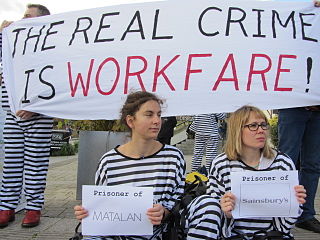
The welfare state of the United Kingdom began to evolve in the 1900s and early 1910s, and comprises expenditures by the government of the United Kingdom of Great Britain and Northern Ireland intended to improve health, education, employment and social security. The British system has been classified as a liberal welfare state system.

The Solidarity Federation, also known by the abbreviation SolFed, is a federation of class struggle anarchists active in Britain. The organisation advocates a strategy of anarcho-syndicalism as a method of abolishing capitalism and the state, and describes itself as a "revolutionary union". In 1994 it adopted its current name, having previously been the Direct Action Movement since 1979, and before that the Syndicalist Workers' Federation since 1950.
Unemployment benefits, also called unemployment insurance, unemployment payment, unemployment compensation, or simply unemployment, are payments made by authorized bodies to unemployed people. In the United States, benefits are funded by a compulsory governmental insurance system, not taxes on individual citizens. Depending on the jurisdiction and the status of the person, those sums may be small, covering only basic needs, or may compensate the lost time proportionally to the previous earned salary.
The New Deal was a workfare programme introduced in the United Kingdom by the first New Labour government in 1998, initially funded by a one-off £5 billion windfall tax on privatised utility companies. The stated purpose was to reduce unemployment by providing training, subsidised employment and voluntary work to the unemployed. Spending on the New Deal was £1.3 billion in 2001.
Jobseeker's Allowance (JSA) is an unemployment benefit paid by the Government of the United Kingdom to people who are unemployed and actively seeking work. It is part of the social security benefits system and is intended to cover living expenses while the claimant is out of work.
Workfare is a governmental plan under which welfare recipients are required to accept public-service jobs or to participate in job training. Many countries around the world have adopted workfare to reduce poverty among able-bodied adults; however, their approaches to execution vary. The United States and United Kingdom are two countries utilizing workfare, albeit with different backgrounds.
Work for the Dole is an Australian Government program that is a form of workfare, or work-based welfare. It was first permanently enacted in 1998, having been trialled in 1997. It is one means by which job seekers can satisfy the "mutual obligation requirements" to receive the Newstart Allowance, now replaced by the JobSeeker Payment. Other "mutual obligation" measures can include: accredited study, part-time work, Australian Army Reserves, and volunteer work.

Youth unemployment in the United Kingdom is the level of unemployment among young people, typically defined as those aged 18–25. A related concept is graduate unemployment which is the level of unemployment among university graduates. Statistics for June 2010 show that there are 926,000 young people under the age of 25 who are unemployed which equates to an unemployment rate of 19.6% among young people. This is the highest youth unemployment rate in 17 years. In November 2011 youth unemployment hit 1.02 million, but had fallen to 767,000 by August 2014. The high levels of youth unemployment in the United Kingdom have led some politicians and media commentators to talk of a "lost generation".
Universal Credit is a United Kingdom social security payment. It is means-tested and is replacing and combining six benefits, for working-age households with a low income: income-related Employment and Support Allowance, income-based Jobseeker's Allowance, and Income Support; Child Tax Credit and Working Tax Credit; and Housing Benefit. An award of UC is made up of different elements, which become payable to the claimant if relevant criteria apply: a standard allowance for singles or couples, child elements and disabled child elements for children in the household, housing cost element, childcare costs element, as well as elements for being a carer or having an illness or disability and therefore having limited capability to work.

Unemployment in the United Kingdom is measured by the Office for National Statistics. As of February 2024, the U.K. unemployment rate is 3.8%, down from 3.9% in January.

R v Secretary of State for Work and Pensions [2013] UKSC 68 is a United Kingdom constitutional law and labour law case that found the conduct of the Department for Work and Pensions "workfare" policy was unlawful. Caitlin Reilly, an unemployed geology graduate, and Jamieson Wilson, an unemployed driver, challenged the Jobcentre policy of making the unemployed work for private companies to get unemployment income. The outcome of the case affects over 3,000 claimants and entails around £130m unpaid benefits.
Mandatory Work Activity (MWA) was a workfare programme in the United Kingdom whereby individuals had to work for their benefits or risk being "sanctioned" and losing them. MWA started in May 2011, but in November 2015 the DWP confirmed it was "not renewing" it. An academic analysis by the Department for Work and Pensions cast doubt on the effectiveness of MWA, and despite finding "little evidence" that workfare improved claimants gaining paid employment, the DWP ignored the findings of the study, and in June 2012, the scheme received a £5m expansion. A similar but little-known scheme "Jobseeker Mandatory Activity" (JMA) was piloted by New Labour in 2006, but did not last beyond 2008. JMA targeted those claimants 25 and over, who had been unemployed for 6 months or more and made claimants liable to "sanction" for non-compliance.

Workfare in the United Kingdom is a system of welfare regulations put into effect by UK governments at various times. Individuals subject to workfare must undertake work in return for their welfare benefit payments or risk losing them. Workfare policies are politically controversial. Supporters claim that such policies help people move off welfare and into employment whereas critics argue that they are analogous to slavery or indentured servitude and counterproductive in decreasing unemployment.
The Work Programme (WP) was a UK government welfare-to-work programme introduced in Great Britain in June 2011. It was the flagship welfare-to-work scheme of the 2010–2015 UK coalition government. Under the Work Programme the task of getting the long-term unemployed into work was outsourced to a range of public sector, private sector and third sector organisations. The scheme replaced a range of schemes which existed under previous New Labour governments including Employment Zones, New Deal, Flexible New Deal and the now abolished Future Jobs Fund scheme which aimed to tackle youth unemployment. Despite being the flagship welfare-to-work scheme of the Conservative-led coalition government, and then the incumbent Conservative government from May 2015, the DWP announced, in November 2015, that it was replacing the Work Programme and Work Choice with a new Work and Health Programme for the longer-term unemployed and those with health conditions. The DWP also announced that it would not be renewing Mandatory Work Activity and Help to Work which included Community Work Placements.
The Future Jobs Fund was a UK government initiative introduced in 2009 which aimed to help long term unemployed people back into employment. It was cut by the Coalition government, Prime Minister David Cameron claiming the scheme was "expensive, badly targeted and did not work". However, a 2012 report by the Department for Work and Pensions (DWP) found that the scheme produced a net benefit though tax receipts and a reduced benefits bill. It estimated that the FJF programme resulted in:

The Jobseekers Act 2013 is an emergency Act of Parliament of the United Kingdom introduced to the House of Commons in March 2013. It retrospectively changed the law to make past actions of the government which the courts had found unlawful to be lawful. As of July 2014, the Act has been found to contravene Article 6 of the European Convention on Human Rights.
Family Income Supplement was a means-tested benefit for working people with children introduced in Britain in 1970 by the Conservative government of Edward Heath, effective from August 1971. It was not intended to be a permanent feature of the social security system and was abolished by the Social Security Act 1986, which replaced it with Family Credit.
Community Work Placements were a UK Government workfare scheme under which unemployed claimants had to work for up to 26 weeks/30 hours in order to continue to receive Jobseekers Allowance The policy has been criticized by a number of organizations. Community Work Placements (CWPs) were launched at the start of 2014, but it was announced in November 2015, that the DWP was "not renewing" them.
Edinburgh Coalition Against Poverty also known as ECAP, is a left-wing organisation which aims to be a solidarity network for working-class people particularly the unemployed and disabled. It is independent from government and operates by direct democracy.

Iain Duncan Smith served as Secretary of State for Work and Pensions from 2010 to 2016. A member and previous leader of the Conservative Party, Duncan Smith was appointed to the cabinet by Prime Minister David Cameron following the 2010 general election and the formation of the coalition government between the Conservatives and the Liberal Democrats. He was reappointed after the Conservatives won a majority in the 2015 general election but resigned in March 2016 in opposition to disability benefit cuts.







